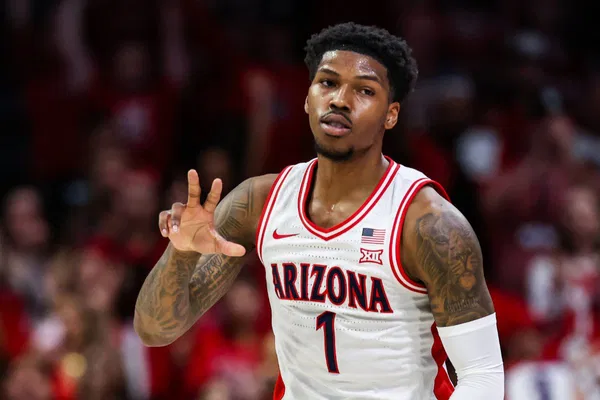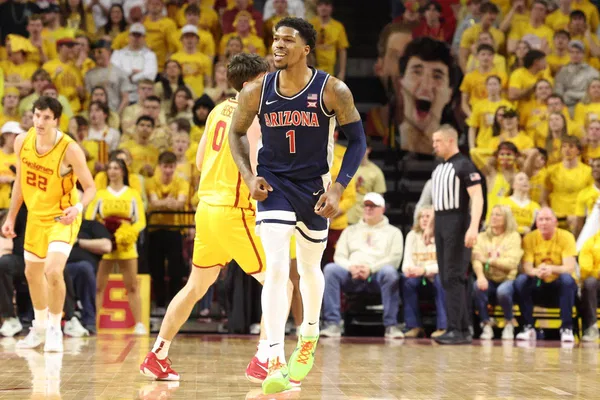
Caleb Love, the standout guard for the Arizona Wildcats, has built a reputation as a clutch performer, a legacy that traces back to his unforgettable display during the 2022 NCAA Tournament. In the Sweet Sixteen matchup against UCLA, Love delivered an electrifying second-half performance, scoring 27 points and sinking a decisive step-back three-pointer that crushed the Bruins’ hopes. His fearless shot-making drew comparisons to some of the NBA’s most clutch players, further cementing his status as a March Madness legend.
A Journey Marked by Challenges and Determination
Off the court, Love’s career path has been nothing short of a basketball odyssey. After playing a key role in North Carolina’s legendary “Iron Five” run to the national championship game, he initially intended to transfer to Michigan. However, a transfer credit issue prevented the move, ultimately leading him to join the Arizona Wildcats. Despite the twists and turns in his collegiate career, Love has consistently demonstrated resilience, a trait deeply ingrained in him through his upbringing and family values.
Influence of His Father, Dennis Love
A significant figure in Caleb’s development as both an athlete and an individual is his father, Dennis Love. With a background in the U.S. military, Dennis instilled in his son a strong sense of discipline and structure, key elements that have shaped Caleb’s approach to basketball and life. Serving in the military during the late 1990s, Dennis often shared stories of perseverance, helping Caleb navigate the pressures of collegiate athletics.
Beyond his military experience, Dennis also played college football, giving him firsthand knowledge of the dedication and mindset required to excel in competitive sports. Caleb has openly acknowledged the invaluable guidance his father has provided, particularly when it comes to handling the complexities of Name, Image, and Likeness (NIL) deals and the intense scrutiny that comes with being a top college basketball player. Their relationship, built on trust and communication, has been a crucial factor in Caleb’s ability to adapt and succeed.
Dennis has expressed pride in his son’s growth, highlighting how Caleb overcame early struggles in his freshman year. According to him, adversity could have caused Caleb to retreat, but instead, he matured and took charge of his own development. He emphasized that Caleb has reached a point where his parents no longer need to guide his every move—he now takes responsibility for his own decisions and future.
The Role of His Mother, Alecia Thompson

While his father provided discipline, Caleb’s mother, Alecia Thompson, played an equally vital role in his journey by offering emotional support and balance. She has been a steady presence, ensuring that Caleb remains grounded despite the pressures of high-level college basketball.
Alecia was particularly close to her father, Caleb’s maternal grandfather, who always showed great enthusiasm for Caleb’s career. She often joked that when her father called, the first thing he would ask was, “Where’s Caleb?” rather than checking in on her. This deep-rooted family bond has been a central force in Caleb’s life.
Although Alecia and Dennis are no longer together, they have remained united in their efforts to support their son. A memorable moment occurred when Caleb led North Carolina to the Elite Eight in 2022—after the game, he shared an emotional moment with his mother, reinforcing the idea that, regardless of any past difficulties, the family always comes together to support him.
Family Background and Nationality
Both Dennis Love and Alecia Thompson are American nationals from St. Louis, Missouri. While they have not publicly discussed their heritage beyond their American identity, their influence on Caleb’s upbringing and career is undeniable.
The Impact of Family on Caleb Love’s Success
Caleb Love’s rise to stardom is not solely a product of his talent; it is also a reflection of the strong family foundation that has supported him. His father’s discipline and structured guidance, combined with his mother’s unwavering emotional support, have helped shape him into the player and person he is today. His journey serves as a testament to the critical role that family can play in the development of young athletes, providing them with the resilience and confidence needed to navigate the challenges of elite competition.